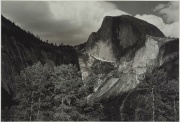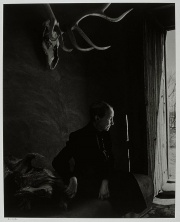Difference between revisions of "Photograph paper"
| Line 1: | Line 1: | ||
[[File:1995.760-SC19776.jpg|thumb|Photograph of Yosemite<br>MFA# 1995.760]] | [[File:1995.760-SC19776.jpg|thumb|Photograph of Yosemite<br>MFA# 1995.760]] | ||
== Description == | == Description == | ||
| − | [[File:1996.175-SC8148.jpg|thumb|Photograph of Georgia O'Keefe | + | [[File:1996.175-SC8148.jpg|thumb|Photograph of Georgia O'Keefe; MFA# 1996.175]] |
A high grade of paper used for photographic prints. Good photograph paper is made from 100% [[cotton|cotton]] or [[linen|linen]] rags because [[lignin|lignin]] and other residues react with the photosensitive salts and destroy the image. Photographic paper also has to be strong, uniform, and dimensionally stable when wet and dry. For increased wet-strength, the papers were sized with [[animal%20glue|animal glue]], [[starch|starch]], [[stearic%20acid|stearic acid]], or synthetic resins, such as [[melamine%20resin|melamine]] (used since 1948). One or more fillers, such as [[barium%20sulfate|barium sulfate]], [[titanium%20dioxide|titanium dioxide]], [[clay|clay]], [[starch|starch]], or [[acrylamide%20resin|polyacrylamide]], are also added for opacity, color, and strength. The papers were calendered to produce a smooth, nonporous surface. Since the late 1960s, most color photographic papers have been made from cellulose fibers coated on both sides with [[polyethylene|polyethylene]]. | A high grade of paper used for photographic prints. Good photograph paper is made from 100% [[cotton|cotton]] or [[linen|linen]] rags because [[lignin|lignin]] and other residues react with the photosensitive salts and destroy the image. Photographic paper also has to be strong, uniform, and dimensionally stable when wet and dry. For increased wet-strength, the papers were sized with [[animal%20glue|animal glue]], [[starch|starch]], [[stearic%20acid|stearic acid]], or synthetic resins, such as [[melamine%20resin|melamine]] (used since 1948). One or more fillers, such as [[barium%20sulfate|barium sulfate]], [[titanium%20dioxide|titanium dioxide]], [[clay|clay]], [[starch|starch]], or [[acrylamide%20resin|polyacrylamide]], are also added for opacity, color, and strength. The papers were calendered to produce a smooth, nonporous surface. Since the late 1960s, most color photographic papers have been made from cellulose fibers coated on both sides with [[polyethylene|polyethylene]]. | ||
Latest revision as of 08:44, 18 October 2022
Description
A high grade of paper used for photographic prints. Good photograph paper is made from 100% Cotton or Linen rags because Lignin and other residues react with the photosensitive salts and destroy the image. Photographic paper also has to be strong, uniform, and dimensionally stable when wet and dry. For increased wet-strength, the papers were sized with Animal glue, Starch, Stearic acid, or synthetic resins, such as melamine (used since 1948). One or more fillers, such as Barium sulfate, Titanium dioxide, Clay, Starch, or polyacrylamide, are also added for opacity, color, and strength. The papers were calendered to produce a smooth, nonporous surface. Since the late 1960s, most color photographic papers have been made from cellulose fibers coated on both sides with Polyethylene.
Synonyms and Related Terms
photographic paper; photo paper; sensitized paper; photo-sensitized paper; polyethylene-laminated paper; papier photographique (Fr.)
Resources and Citations
- K.B.Kasper, R.Wanka, "Chemical Formulations and Requirements of Photographic Paper", Journal of Applied Photographic Engineering, Vol.7 (3), June 1981.
- James M. Reilly, Albumen & Salted Paper Book: The history and practice of photographic printing, 1840-1895, Light Impressions Corp., Rochester, NY, 1980
- The Dictionary of Paper, American Paper Institute, New York, Fourth Edition, 1980
- E.J.LaBarre, Dictionary and Encyclopedia of Paper and Paper-making, Swets & Zeitlinger, Amsterdam, 1969
- Art and Architecture Thesaurus Online, http://www.getty.edu/research/tools/vocabulary/aat/, J. Paul Getty Trust, Los Angeles, 2000

